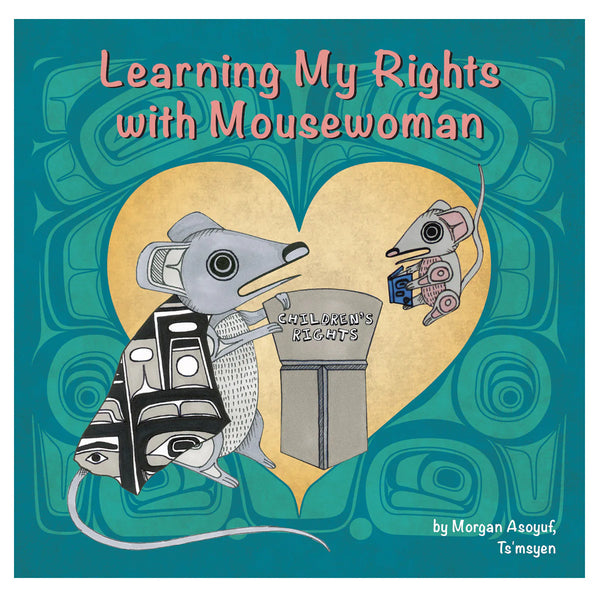Morgan Asoyuf, a Tsimshian writer and artist, has created an engaging board book in which she introduces toddlers/preschoolers to Mousewoman who is described on the book’s back cover as:
a legendary figure in the oral and visual practices of Northwest Coast Indigenous cultures. She is both grandmother and oracle, able to travel in and out of the spirit world. Mousewoman sits on young people’s shoulders in crucial times, whispering advice and knowledge. She protects and guides young people by helping them avoid or escape bad situations, and is never afraid to stand up to bigger beings.
As well, the back cover identifies the book’s purpose: “This book brings to life the timeless lessons of Mousewoman—lessons that embody the principles outlined in the UN Declaration on the Rights of the Child and the UN Declaration on the Rights of Indigenous Peoples.”
Mousewoman opens the book by saying to a pair of mouse children, “All children have rights. Let’s learn about your rights...” However, after that initial use of the second person pronoun, the text switches to the first personal singular as a child mouse lists one by one more than a dozen “rights” it has, with each being accompanied by an Asoyuf formline illustration depicting a child experiencing the fulfillment of that right. For example, the illustration that goes with the text in the opening “Excerpt” shows a child mouse being hugged by an adult mouse, both enclosed within a heart. In some instances, a right is prefaced with some additional text to provide context, with an example being:
The world is a beautiful place,
filled with rivers, lakes,
trees, flowers, and wildlife.
I have the right to enjoy it.
In this instance, experiencing the right also brings with it some responsibilities:
We all have to love and
care for this beautiful world.
Via the illustration connected to “I have the right to be creative and express myself”, which shows a mouse child in a wheelchair painting a picture, Asoyuf, reinforces that these rights are inclusive and belong to all children.
Learning My Rights with Mousewoman is a board book that needs to be revisited many times in order to unpack the fullness of what is imbedded within these rights, with just one example being, “This is my body. I have the right to safe touch.” Though Asoyuf ‘s words may resonate first with Northwest Coast Indigenous cultures because of her illustration style, settler readers may be prompted to action when they share the book with their young children and read, for example, “I have the right to healthy food and clean water”, and recall the ongoing boil water advisories on so many First Nations reserves.

